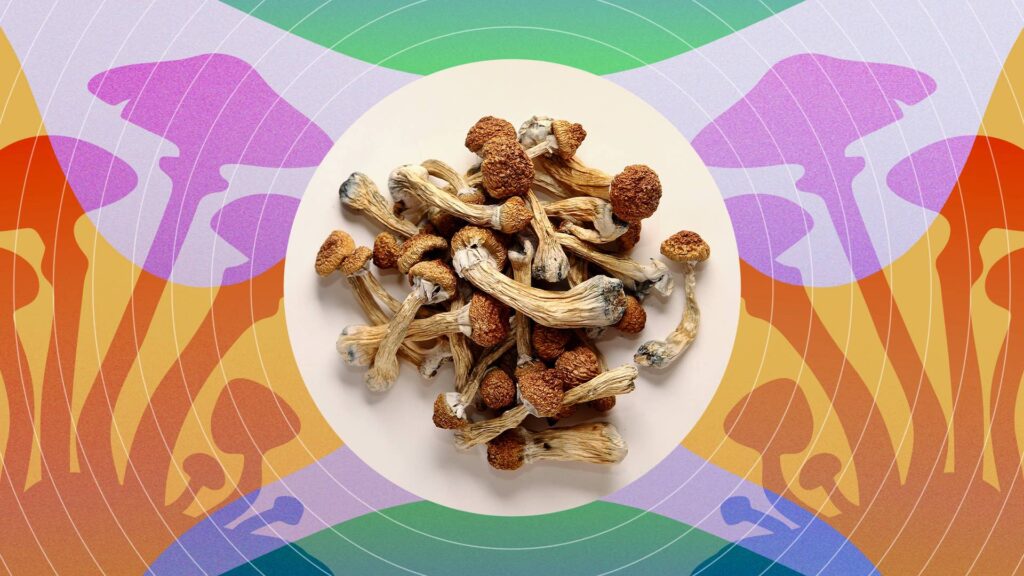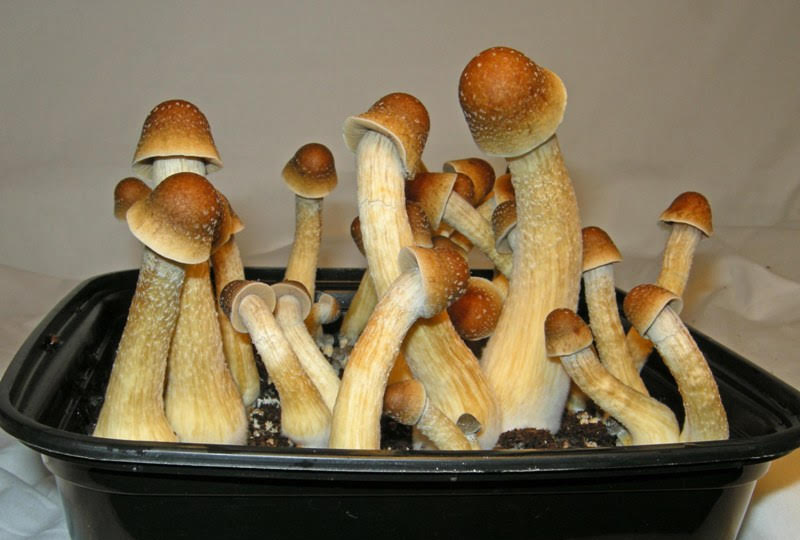Initiative 58: The Natural Medicine Health Act
On July 21, Colorado’s secretary of state confirmed that voters will approve or reject a multifaceted psychedelics medical legalization and decriminalization measure—called the Natural Medicine Health Act (NMHA), or Initiative 58—on this year’s Nov. 8 ballot.
Read the full 18-page proposal here: Natural Medicine Health Act.
What’s the current law?
In May of 2019, Denver voters narrowly approved a ballot measure to effectively decriminalize psilocybin use and possession.
A few weeks later, Governor Jared Polis (D) signed House Bill 19-1263, which made the possession of small quantities of Schedule I or Schedule II substances a misdemeanor instead of a felony, statewide. That law went into effect in March 2020.
Otherwise, entheogens—another term for psychoactive substances, typically plants and fungi—remain illegal in Colorado.
Related
How to dose psychedelic mushrooms
What Initiative 58 would do
The Natural Medicine Health Act covers a lot of ground.
First and foremost, it would effectively decriminalize the possession, use, personal cultivation, gifting, and transport of naturally-occuring entheogens statewide. Decriminalization would happen immediately upon certification of the vote.
The measure would additionally establish a framework for a medical psilocybin industry and begin the process of licensing “healing centers,” where adults could legally consume psilocybin with the assistance of trained facilitators. Participants would be required to attend three sessions: Preparation, Administration and Integration. Treatment would likely cost around $3,000, according to a lead proponent of the measure.
The Natural Medicine Health Act would additionally kickstart the process of licensing manufacturers, testing labs, and transporters.
The measure requires the existing Colorado Department of Regulatory Agencies (DORA)—led by a new, 15-member Natural Medicine Advisory Board—to establish rules for the program by September 30, 2024, and begin accepting licenses on the same day. The measure stipulates that all decisions regarding the licenses must be made no more than 60 days later.
After June 1, 2026, the advisory board can decide to expand the scope of the law to provide a similarly regulated market for any or all of the following entheogens: Ibogaine, dimethyltryptamine (DMT), and mescaline (not derived from peyote).

What’s required to pass it?
Initiative 58 would change state law, not the state constitution, and so a simple majority of votes is necessary for passage.
If it passes, when would psychedelics become legal for medical use? When would they become decriminalized?
Decriminalization would take effect with the confirmation of the November vote. The state would subsequently approve “healing centers” and other related licenses in late 2024.
How many mushrooms or other substances could I possess?
Initiative 58 does not include specific language around possession limits of entheogens.
When could I start growing my own?
Personal cultivation would become decriminalized immediately upon certification of the vote.
Related
Adaptogenic mushrooms: Not quite magic, but they’ll give your morning coffee a lift
When would psilocybin “healing centers” open?
The NMHA requires licensing to begin by September 2024, with a 60-day deadline to approve or deny all licenses. It’s unclear how much later the first centers would open.
Could I consume entheogens in public?
No. The measure stipulates that adults may not “ingest” entheogens in public, or while operating a vehicle.
Will it pass? Here’s what the latest polls say
A 2021 poll in Colorado conducted by an organization working in conjunction with the Natural Medicine Colorado campaign reported that 50% of respondents would support legalizing psilocybin. The Natural Medicine Colorado campaign confirmed to Leafly that no internal polls have been taken this year.
Legalization initiative sponsors
The organization Natural Medicine Colorado runs the Natural Medicine Health Act campaign.
The group has two leaders: Kevin Matthews and Veronica Lightning Horse Perez.
Matthews is the former campaign manager of Decriminalize Denver, which led the successful 2019 campaign to effectively decriminalize psilocybin use and possession within the city.
Perez is a neuro-linguistic programming (NLP) practitioner and therapist.
The Natural Medicine Colorado campaign has also received substantial support from the New Approach PAC. The Washington, DC, group has already donated over $2.7 million to the campaign.
David Bronner, CEO of Dr. Bronner’s soap company, has also endorsed the initiative. Campaign finance reports show that neither he nor the Dr. Bronners’ company have donated to Natural Medicine Colorado.

Legalization initiative opponents
Decriminalize Nature Colorado—a separate organization of pro-decriminalization advocates—have proven to be among the most outspoken opponents of Initiative 58.
The group championed a competing measure this year, Initiative 61, which failed to gather enough signatures to make the 2022 ballot. That measure sought only to decriminalize entheogens, not create a framework for full medical legalization.
Would psilocybin “healing centers” be licensed?
Yes. Initiative 58 requires healing centers—and the facilitators that work at them—to be licensed by a 15-member Natural Medicine Advisory Board working within the Colorado Department of Regulatory Agencies (DORA).
Any equity or small-business licenses?
The measure prevents regulators from “[imposing] unreasonable financial or logistical barriers” that would make it difficult for “low income people” to become facilitators of psilocybin therapy sessions. It does not include additional language around equity or small-business licenses for healing centers, manufacturers, or transporters.
How many healing centers or other licenses would be allowed?
The measure does not include any language around limitation on any particular type of license, but dictates that an individual cannot have a financial interest in more than five healing centers.
Could local towns or counties ban healing centers?
The measure stipulates that a locality “may not ban or completely prohibit the establishment or operation of healing centers.” Localities however, can zone healing centers, and put “reasonable” limits on their operating hours.

Would entheogens be taxed?
The measure does not include specific language around taxation..
What about the expungement process?
The Natural Medicine Health Act calls for individuals who have completed sentences for offenses rendered legal by the act to be able to petition to have their record sealed. In Colorado, expungement is typically only applied to juveniles’ records.
5 things to know about Colorado’s Natural Medicine Health Act
- The NMHA decriminalizes entheogens quickly, once Colorado officials confirm an affirmative vote of the measure.
- Legalization would occur in two tiers: First with psilocybin, then—with sign-off from a yet-to-be-established advisory board—a handful of other entheogens in 2026.
- The measure does not allow a county or municipality to opt out of sales, but allows them to zone “healing centers” and limit operating hours.
- It calls for the records of past offenders to be sealed, but not expunged.
- Treatment would likely cost around $3,000, although the measure calls for the state to “incentivize” reduced price treatment for “low income” individuals.
Quotes from advocates
- “I see what the NMHA does as one seamless policy: making natural medicines—psychedelic plant and fungal medicines containing psilocybin, DMT, ibogaine or mescaline (excepting peyote)—available to all adult Coloradans in two powerful healing modalities: via a regulated access model in a therapeutic context; and the self-regulating community healing model in a decriminalized context.” – David Bronner, CEO of Dr. Bronner’s Soap Company, in a blog post
- “I must get a call a week from people asking ‘How do we make money from this? How do we do it?’ I say, we don’t. It’s not as if you’re going to be able to walk down the street and see a psilocybin shop on the corner.” – Rick Ridder, campaign consultant and partner of RBI Strategies & Research, to Leafly
Quotes from opponents
- “We’re not ready. We’re rushing. It’s going to be inaccessible and expensive.” – Melanie Rose Rodgers, co-proponent of Initiative 61, to Leafly
- “I do not personally align with I-58 and the heavy out-of-state influence calling the shots in Colorado. What happened with cannabis is happening with mushrooms. Folks from marginalized communities, People of Color are being left out– once again. With all the inequality and rolling back of freedoms that exist today, let us not create new industries that will cater and serve the rich and wealthy while opening the floodgates for anyone able to buy Colorado “healing center” licenses. I am opposed to the corporate takeover of sacred earth medicines and psychedelics written in I-58. While Natural Medicine Colorado sounds amazing, please be discerning and read their 18-page initiative and ask about the funding,” Melanie Rose Rodgers, Co-proponent of Initiative 61, to Let’s Talk Hemp.
By submitting this form, you will be subscribed to news and promotional emails from Leafly and you agree to Leafly’s Terms of Service and Privacy Policy. You can unsubscribe from Leafly email messages anytime.

